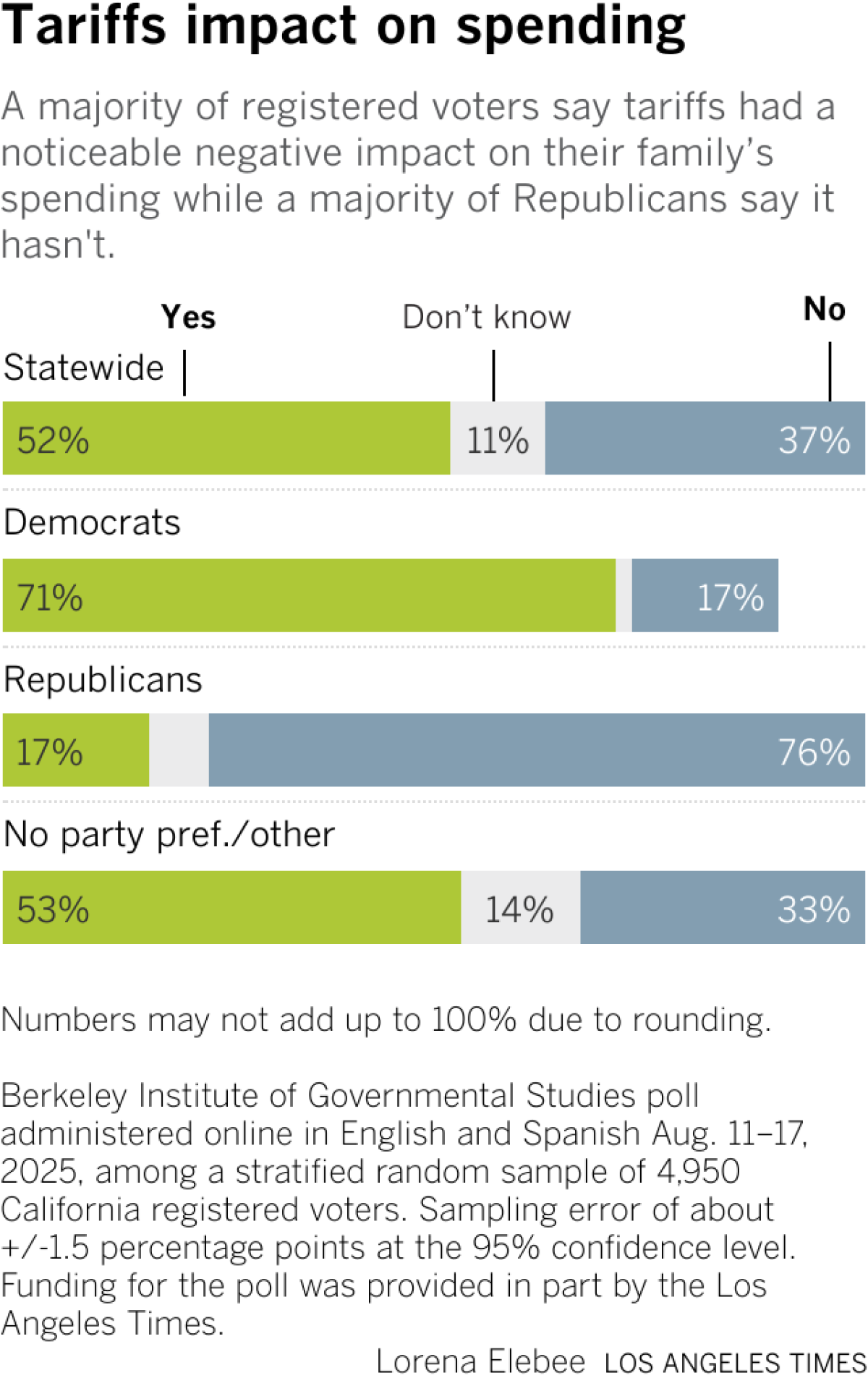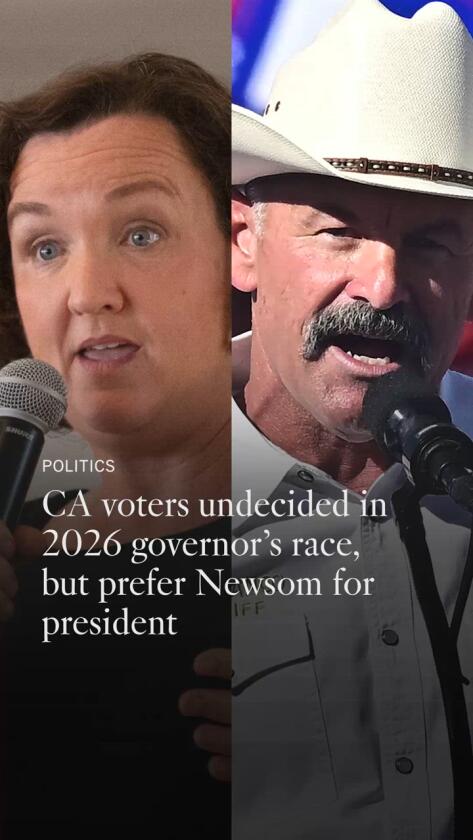Poll finds partisan split in California on U.S. direction under Trump
California voters are heavily divided along partisan lines when it comes to President Trump, with large majorities of Democrats and unaffiliated voters disapproving of him and believing the country is headed in the wrong direction under his leadership, and many Republicans feeling the opposite, according to a new poll conducted for The Times.
The findings are remarkably consistent with past polling on the Republican president in the nation’s most populous blue state, said Mark DiCamillo, director of the UC Berkeley Institute of Governmental Studies Poll.
“If you look at all the job ratings we’ve done about President Trump — and this carries back all the way through his first term — voters have pretty much maintained the same posture,” DiCamillo said. “Voters know who he is.”
The same partisan divide also showed up in the poll on a number of hot-button issues, such as Medicaid cuts and tariffs, DiCamillo said — with Democrats “almost uniformly” opposed to Trump’s agenda and Republicans “pretty much on board with what Trump is doing.”
Asked whether the sweeping tariffs that Trump has imposed on international trading partners have had a “noticeable negative impact” on their family spending, 71% of Democrats said yes, while 76% of Republicans said no.
“If you’re a Republican, you tend to discount the impacts — you downplay them or you just ignore them,” while Democrats “tend to blame everything on Trump,” DiCamillo said.
Asked whether they were confident that the Trump administration would provide California with the nearly $40 billion in wildfire relief aid it has requested in response to the devastating L.A.-area fires in January, 93% of Democrats said they were not confident — compared with the 43% of Republicans who said they were confident.
In a state where registered Democrats outnumber Republicans nearly 2 to 1, the effect is that Trump fared terribly in the poll overall, just as he has in recent presidential votes in the state.
The poll — conducted Aug. 11-17 with 4,950 registered voters interviewed — found 69% of likely California voters disapproved of Trump, with 62% strongly disapproving, while 29% approved of him. A similar majority, 68%, said they believed the country is headed in the wrong direction, while 26% said it’s headed in the right direction.
Whereas 90% of Democrats and 75% of unaffiliated voters said the country is on the wrong track, just 20% of Republicans felt that way, the poll found.
The White House did not respond to a request for comment on the poll.
Sen. Alex Padilla (D-Calif.) said the findings prove Trump’s agenda “is devastating communities across California who are dealing with the harmful, real life consequences” of the president’s policies.
“The Trump Administration does not represent the views of the vast majority of Californians and it’s why Trump has chosen California to push the limits of his constitutional power,” Padilla said. “As more Americans across the nation continue to feel the impacts of his destructive policies, public support will continue to erode.”
G. Cristina Mora, co-director of the UC Berkeley Institute of Governmental Studies, or IGS, said the findings were interesting, especially in light of other recent polling for The Times that found slightly more nuanced Republican impressions — and more wariness — when it comes to Trump’s immigration agenda and tactics.
On his overall approval and on other parts of his agenda, including the tariffs and Medicaid cuts, “the strength of the partisanship is very clear,” Mora said.
Cuts to Medicaid
Voters in the state are similarly divided when it comes to recent decisions on Medicaid health insurance for low-income residents, the poll found. The state’s version is known as Medi-Cal.
For instance, Californians largely disapprove of new work requirements for Medicaid and Medi-Cal recipients under the Big Beautiful Bill that Trump championed and congressional Republicans recently passed into law, the poll found.
The bill requires most Medicaid recipients ages 18 to 64 to work at least 80 hours per month in order to continue receiving benefits. Republicans trumpeted the change as holding people accountable and safeguarding against abuses of federal taxpayer dollars, while Democrats denounced it as a threat to public health that would strip millions of vulnerable Americans of their health insurance.
The poll found 61% of Californians disapproved of the change, with 43% strongly disapproving of it, while 36% approved of it, with 21% strongly approving of it. Voters were sharply divided along party lines, however, with 80% of Republicans approving of the changes and 85% of Democrats disapproving of them.
Californians also disapproved — though by a smaller margin — of a move by California Democrats and Gov. Gavin Newsom to help close a budget shortfall by barring undocumented immigrant adults from newly enrolling in Medi-Cal benefits.
A slight majority of poll respondents, or 52%, said they disapproved of the new restriction, with 17% strongly disapproving of it. The poll found 43% of respondents approved of the change, including 30% who strongly approved of it.
Among Democrats, 77% disapproved of the change. Among Republicans, 87% approved of it. Among voters with no party preference, 52% disapproved.
More than half the poll respondents — 57% — said neither they nor their immediate family members receive Medi-Cal benefits, while 35% said they did. Of those who receive Medi-Cal, two-thirds — or 67% — said they were very or somewhat worried about losing, or about someone in their immediate family losing, their coverage due to changes by the Trump administration.
Nadereh Pourat, associate director of the UCLA Center for Health Policy Research, said there is historical evidence to show what is going to happen next under the changes — and it’s not good.
The work requirement will undoubtedly result in people losing health coverage, just as thousands did when Arkansas implemented a similar requirement years ago, she said.
When people lose coverage, the cost of preventative care goes up and they generally receive less of it, she said. “If the doctor’s visit competes with food on the table or rent, then people are going to skip those primary care visits,” she said — and often “end up in the emergency room” instead.
And that’s more expensive not just for them, but also for local and state healthcare systems, she said.
Cuts to high-speed rail
Californians also are heavily divided over the state’s efforts to build a high-speed rail line through the Central Valley, after the Trump administration announced it was clawing back $4 billion in promised federal funding.
The project was initially envisioned as connecting Los Angeles to San Francisco by 2026, but officials have since set new goals of connecting Bakersfield to Merced by 2030. The project is substantially over budget, and Trump administration officials have called in a “boondoggle.”
The poll found that 49% of Californians support the project, with 28% of them strongly in favor of it. It found 42% oppose the project, including 28% who strongly oppose it.
Among Democrats, 66% were in favor of the project. Among Republicans, 77% were opposed. Among voters with no party preference, 49% were in favor while 39% were opposed.
In Los Angeles County, 54% of voters were in favor of the project continuing, while 58% of voters in the Bay Area were in favor. In the Central Valley, 51% of voters were opposed, compared with 41% in favor.
State Sen. Dave Cortese (D-San José), who chairs the Senate Transportation Committee, said political rhetoric around the project has clearly had an effect on how voters feel about it, and that is partly because state leaders haven’t done enough to lay out why the project makes sense economically.
“Healthy skepticism is a good thing, especially when you’re dealing with billions of dollars,” he said. “It’s on legislators and the governor right now in California to lay out a strategy that you can’t poke a lot of holes in, and that hasn’t been the case in the past.”
Cortese said he started life as an orchard farmer in what is now Silicon Valley, knows what major public infrastructure investments can mean for rural communities such as those in the Central Valley, and will be hyperfocused on that message moving forward.
“There is no part of California that I know of that’s been waiting for more economic development than Bakersfield. Probably second is Fresno,” he said.
He said he also will be stressing to local skeptics of the project that supporting the Trump administration taking $4 billion away from California would be a silly thing to do no matter their politics. Conservative local officials who understand that will be “key to help us turn the tide,” he said.
Last month, California’s high-speed rail authority sued the Trump administration over the withdrawal of funds. The state is also suing the Trump administration over various changes to Medicaid, over Trump’s tariffs and over immigration enforcement tactics.
Mora said the sharp divide among Democrats and Republicans on Trump and his agenda called to mind other recent polling that showed many voters immediately changed their views of the economy after Trump took office — with Republicans suddenly feeling more optimistic, and Democrats more pessimistic.
It’s all a reflection of our modern, hyperpartisan politics, she said, where people’s perceptions — including about their own economic well-being — are “tied now much more closely to ideas about who’s in power.”

